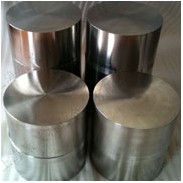
hastelloyC-276
Hastelloy C-276 tungsten-nickel-chromium-molybdenum alloy
Features and applications overview:
The alloy has excellent corrosion to the majority of corrosive media in the oxidation and reduction state. It has excellent resistance to pitting corrosion, crevice corrosion, and stress corrosion cracking. The alloy is suitable for containing various oxidizing and reducing media industrial chemical processes. High molybdenum and chromium content of the alloy can be resistant to chloride ion erosion, and tungsten element also further improves its corrosion resistance. Hastelloy C-276 is one of the only several materials resistant to the corrosion of wet chlorine gas, hydrochloride and chlorine dioxide solution. The alloy has significant corrosion resistance to the high concentration of chloride salts, such as iron chloride and copper chloride.
Hastelloy C-276s similar grades:
W.Nr.2.4819 NiMo16Cr15W (Germany) NC17D (France)
Chemical composition, %:
Nickel........................................balance
Chromium..................................15.0-16.5
Iron.............................................4.0-7.0
Molybdenum..............................15.0-17.0
Cobalt.........................................2.5 max
Carbon........................................0.01 max
Manganese..................................1.0 max
Silicon.........................................0.08 max
Sulfur...........................................0.001 max
Phosphorus...................................0.015 max
Tungsten........................................3.0-4.5
Vanadium.......................................0.1-0.3
Physical properties:
Density, g/cm3 .......................................8.9
Melting Range, °C................................1325-1370
Thermal conductivity, λ/(W/m•°C), at 100°C ......10.2
Specific heat, J/kg•°C............................407
Elastic modulus, GPa............................208
Shear modulus, GPa..............................79
Electrical resistivity, μΩ•m...................1.25
Coefficient of linear expansion, a/10-6°C-1, at 20-100°C........11.7
Mechanical properties:(the minimum value detected at room temperature)
Tensile strength, σb/MPa..................758
Yield strength,σp0.2/MPa.............363
Elongation,σ5 /%....................................62
The way of heat treatment is solution treatment
Available products and specifications:
Bar: ASTM B574, ASME SB574
Forging: ASTM B564, ASME SB564
Plate/Strip: ASTM B575, ASME SB575
Pipe: ASTM B622, ASTM B619, ASTM B626, ASME SB622, ASME SB619, ASME626
The metallurgical structure of Hastelloy C-276:
Hastelloy C-276 is of the face-centered cubic lattice structure.
The process performance and requirements of Hastelloy C-276:
1, The content of sulfur in fuel should be kept as low as possible. The sulfur content of the gas should be less than 0.1%, and in heavy oil should be less than 0.5%.
2, The thermal processing temperature range of the alloy is 1200°C-950°C. The cooling method is water-cooling or other rapid cooling.
3, All conventional welding processes is suitable to apply, such as tungsten electrode inert gas welding, plasma arc welding, handmade sub-arc welding, and metal inert gas shielded arc welding.
Features and applications overview:
The alloy has excellent corrosion to the majority of corrosive media in the oxidation and reduction state. It has excellent resistance to pitting corrosion, crevice corrosion, and stress corrosion cracking. The alloy is suitable for containing various oxidizing and reducing media industrial chemical processes. High molybdenum and chromium content of the alloy can be resistant to chloride ion erosion, and tungsten element also further improves its corrosion resistance. Hastelloy C-276 is one of the only several materials resistant to the corrosion of wet chlorine gas, hydrochloride and chlorine dioxide solution. The alloy has significant corrosion resistance to the high concentration of chloride salts, such as iron chloride and copper chloride.
Hastelloy C-276s similar grades:
W.Nr.2.4819 NiMo16Cr15W (Germany) NC17D (France)
Chemical composition, %:
Nickel........................................balance
Chromium..................................15.0-16.5
Iron.............................................4.0-7.0
Molybdenum..............................15.0-17.0
Cobalt.........................................2.5 max
Carbon........................................0.01 max
Manganese..................................1.0 max
Silicon.........................................0.08 max
Sulfur...........................................0.001 max
Phosphorus...................................0.015 max
Tungsten........................................3.0-4.5
Vanadium.......................................0.1-0.3
Physical properties:
Density, g/cm3 .......................................8.9
Melting Range, °C................................1325-1370
Thermal conductivity, λ/(W/m•°C), at 100°C ......10.2
Specific heat, J/kg•°C............................407
Elastic modulus, GPa............................208
Shear modulus, GPa..............................79
Electrical resistivity, μΩ•m...................1.25
Coefficient of linear expansion, a/10-6°C-1, at 20-100°C........11.7
Mechanical properties:(the minimum value detected at room temperature)
Tensile strength, σb/MPa..................758
Yield strength,σp0.2/MPa.............363
Elongation,σ5 /%....................................62
The way of heat treatment is solution treatment
Available products and specifications:
Bar: ASTM B574, ASME SB574
Forging: ASTM B564, ASME SB564
Plate/Strip: ASTM B575, ASME SB575
Pipe: ASTM B622, ASTM B619, ASTM B626, ASME SB622, ASME SB619, ASME626
The metallurgical structure of Hastelloy C-276:
Hastelloy C-276 is of the face-centered cubic lattice structure.
The process performance and requirements of Hastelloy C-276:
1, The content of sulfur in fuel should be kept as low as possible. The sulfur content of the gas should be less than 0.1%, and in heavy oil should be less than 0.5%.
2, The thermal processing temperature range of the alloy is 1200°C-950°C. The cooling method is water-cooling or other rapid cooling.
3, All conventional welding processes is suitable to apply, such as tungsten electrode inert gas welding, plasma arc welding, handmade sub-arc welding, and metal inert gas shielded arc welding.
Certificate
- ISO
Main Products
high temperature alloys, corrosion resistant alloys, precision alloys
